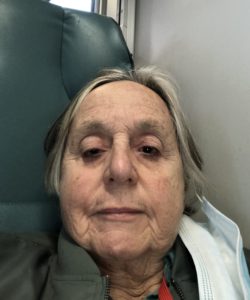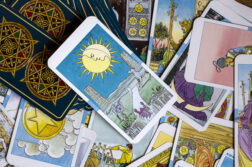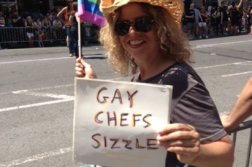 The new docuseries The Lesbian Bar Project, created and directed by Erica Rose and Elina Street, is streaming free on the Roku Channel. The three-part series points out and moves beyond the alarming statistics of the loss of lesbian bars – 200 such bars in 1980, now under 25 – to focus on the resiliency of the bars that survive, their charismatic founders, and the vibrant communities that support them. The series further reveals how the bars survived by morphing into inclusive, joyous places, or, as the owner of Henrietta Hudson says, “queer human spaces built by dykes.” These bars are not just bars, they are living entities with a heartbeat. The series is surprisingly optimistic about the future of lesbian bars. It also honors the elders of the lesbian community, showcasing the often invisible history of our pioneer foremothers.
The new docuseries The Lesbian Bar Project, created and directed by Erica Rose and Elina Street, is streaming free on the Roku Channel. The three-part series points out and moves beyond the alarming statistics of the loss of lesbian bars – 200 such bars in 1980, now under 25 – to focus on the resiliency of the bars that survive, their charismatic founders, and the vibrant communities that support them. The series further reveals how the bars survived by morphing into inclusive, joyous places, or, as the owner of Henrietta Hudson says, “queer human spaces built by dykes.” These bars are not just bars, they are living entities with a heartbeat. The series is surprisingly optimistic about the future of lesbian bars. It also honors the elders of the lesbian community, showcasing the often invisible history of our pioneer foremothers.
The irrepressible Lea DeLaria, “Lord of the Lesbians” executive producer of Orange is the New Black, hosts each episode. Her black hair slicked up into an imposing pompadour, she welcomes “You bitches” and declares: “Strap on for the ride ahead!” This ride will take you to bars in Houston, Phoenix, and New York City, and to their dynamic, resilient owners. In each case, the bars and bar owners help create community in response to urgent needs: the need for a safe place for queer people, an inclusive place of chosen family, and a place where people can be free to be themselves.
Take the story of Julie Marby and Pearl Bar in Houston, which is one of struggle, survival, joy, and building community. The inspiration behind Pearl occurred when Julie saw her older sister, Sarah, also a lesbian, become her authentic self in a lesbian bar. Julie wanted to create a similar safe space for people to be themselves. Pearl is that: a safe, sexy LGBTQ environment where people are happy to be, where they can feel good about themselves.
Julie is “practically married” to Pearl; she is at the bar 24/7, and the community that she helped foster is there for her as well. Together, they pulled Pearl through Covid-19 and the Texas deep freeze. Julie hosts a drag king show called The Kings of Houston, which no other Houston club would allow to perform. Every Sunday, Julie welcomes everyone to her famous crawfish boil. Her patrons call her “Saint Julie,” who “gives more than she receives.”
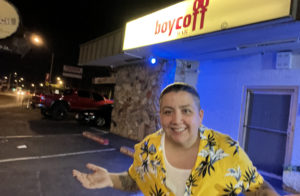
In Phoenix, we hang out with peppy, exuberant Audrey Corley at her Boycott Bar. Born and raised in a Latinx community, Audrey addresses the complexity and trauma of coming out in Catholic Latinx culture. Not accepted at home, when she finally came out in college, Audrey discovered that there were no places to meet women, so she organized weekly lesbian nights at restaurants on their slow nights. These events proved so popular they morphed into Boycott Bar.
A college basketball coach before opening Boycott, Audrey approaches the bar with the same discipline and team-building attitude. For Audrey, it’s all about people: she enjoys helping people grow and watching them become their best selves. She also sees the positive impact Boycott has had upon the Hispanic community, as she hosts family gatherings and events such as Tamales for Toys that assist needy families. Some kids in the Hispanic culture have to grow up really fast, often without much adult support. Audrey is there for them. Boycott’s Latinx bartender, Anaruth, credits Audrey with making her believe in herself and believe that anything is possible.
Audrey is a survivor, resilient and adaptable, qualities that have kept Boycott alive despite the pandemic and Audrey’s personal tragedies. Having moved from a violent neighborhood, Boycott thrives in Phoenix’ LGBT-friendly Melrose district. Audrey calls Boycott a family bar, completely inclusive, there for everyone.
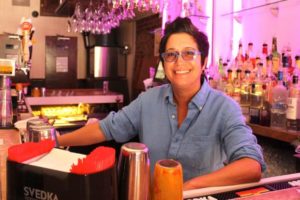
Lisa Cannistrati, owner of Henrietta Hudson is an iconic figure in the lesbian and bar culture of New York. A political activist, she was part of ACT UP early on, demonstrating at Saint Patrick’s cathedral, showing up at Saint Vincent’s hospital, as well as helping at ground zero for AIDS, caring for her gay brothers. For Lisa, the personal is political, and from day one, she sees Henrietta Hudson as a platform for social change
Lisa happened by chance upon the lesbian bar, the original Cubby Hole (now the site of Henrietta Hudson) in the 1970s, seeking to escape the rain. Back then, the West Village was the only place in New York where you could be openly gay. For Lisa, just beginning to date women, the moment was intoxicating. Later, she had not planned on owning a bar, but when she and her partner Minerva Rivers opened Henrietta Hudson on Halloween of 1991 and saw the line of yellow cabs outside the door, they knew they had a hit.
Henrietta Hudson has survived as a cultural and political force in New York, creating chosen LGBTQ families, providing education and healthcare information. With its fresh new DJ’s, Henrietta Hudson is a happy, sexy, multi-generational place to be. Combining the wisdom of experience with the enthusiasm and needs of younger generations, Lisa has made a major contribution to queer nightlife in the city. Looking back at the days of Stonewall and the AIDS crisis, she says that “where we are today is nirvana.” But she also warns: “We can never take it for granted.”
The Lesbian Bar Project, which you can view here, spotlights these bars as cultural spaces, shaped by their owners and communities that preserve queer histories. Role models are scarce in lesbian history, shrouded as it is in silence and invisibility. This docuseries takes a huge step forward in preserving this history and giving us resilient, optimistic heroines who have adapted to changing times and enlarged the idea of lesbian bars to fit today’s needs. Lisa Cannistrati is on the lookout for the next set of queer leaders to pick up the torch.


